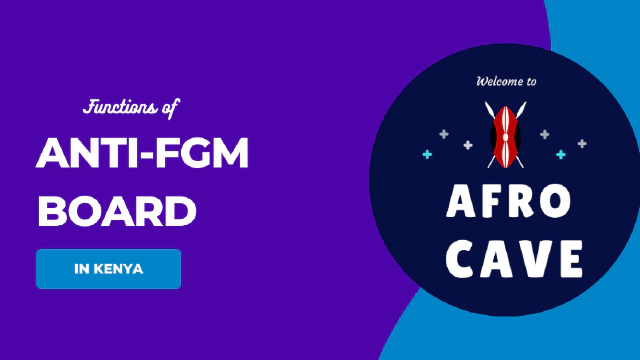The functions of the Anti-FGM Board in Kenya are very important in protecting the rights of women and girls. The Anti Female Genital Mutilation Board (Anti-FGM board Kenya) is established under the Prohibition of FGM Act.
This is a law passed by parliament to prohibit the practice of female genital mutilation in Kenya, to safeguard against violation of a person’s mental or physical integrity through the practice of female genital mutilation and for connected purposes.
Table of Contents Show/Hide
Definition of Female Genital Mutilation
According to the Prohibition of Female Genital Mutilation Act, “female genital mutilation” comprises–
- all procedures involving partial or total removal of the female genitalia or another injury to the female genital organs, or
- any harmful procedure to the female genitalia, for non-medical reasons.
Female Genital Mutilation includes–
- clitoridectomy, which is the partial or total removal of the clitoris or the prepuce;
- excision, which is the partial or total removal of the clitoris and the labia minora, with or without excision of the labia majora;
- infibulation, which is the narrowing of the vaginal orifice with the creation of a covering seal by cutting and appositioning the labia minora or the labia majora, with or without excision of the clitoris.
However, FGM does not include a sexual reassignment procedure or a medical procedure that has a genuine therapeutic purpose.
“Sexual reassignment procedure” in this Act means any surgical procedure that is performed for the purposes of altering (whether wholly or partly) the genital appearance of a person to the genital appearance (as nearly as practicable) of a person of the opposite sex;
Composition of the ANTI-FGM Board Kenya
The Anti-FGM Board shall consist of–
- a chairperson appointed by the President;
- the Principal Secretary of the Ministry for the time being responsible for matters relating to gender or a representative duly appointed in writing;
- the Principal Secretary of the Ministry for the time being responsible for matters relating to finance or a representative duly appointed in writing;
- the Principal Secretary of the Ministry for the time being responsible for matters relating to health or a representative duly appointed in writing;
- the Principal Secretary of the Ministry for the time being responsible for matters relating to education or a representative duly appointed in writing;
- the Principal Secretary of the Ministry for the time being responsible for matters relating to youth affairs or a representative duly appointed in writing;
- three other members appointed by the Cabinet Secretary; and
- the Chief Executive Officer.
A person appointed as a member of the Board, other than an ex officio member, serves for a single term of six years and is not eligible for re-appointment.
Functions of the Anti-FGM Board in Kenya
The functions of the Anti-FGM Board in Kenya are to–
- design, supervise and coordinate public awareness programmes against the practice of female genital mutilation;
- generally, advise the Government on matters relating to female genital mutilation and the implementation of the Anti-FGM Act;
- design and formulate a policy on the planning, financing and coordinating of all activities relating to female genital mutilation;
- provide technical and other support to institutions, agencies and other bodies engaged in the programmes aimed at eradication of female genital mutilation;
- design programmes aimed at eradication of female genital mutilation;
- facilitate resource mobilization for the programmes and activities aimed at eradicating female genital mutilation; and
- perform such other functions as may be assigned by any written law.
Powers of the Anti-FGM Board
The Board shall have all powers necessary for the proper performance of its functions under the Prohibition of Female Genital Mutilation Act. The powers of the Anti-FGM Board in Kenya are to–
- enter into contracts;
- manage, control and administer its assets in such manner and for such purposes as best promote the purpose for which the Board is established;
- determine the provisions to be made for capital and recurrent expenditure and for the reserves of the Board;
- receive any grants, gifts, donations or endowments and make legitimate disbursements therefrom;
- enter into association with such other bodies or organizations within or outside Kenya as it may consider desirable or appropriate and in furtherance of the purposes for which the Board is established;
- open such banking accounts for its funds as may be necessary;
- invest any funds of the Board not immediately required for its purposes; and
- undertake any activity necessary for the fulfilment of any of its functions.
Chief Executive Officer of the Board
The Anti-FGM Board appoints the Chief Executive of the Board. The Chief Executive Officer shall hold office for a period of not more than five years, on such terms and conditions of employment as the Board may determine, and is eligible for re-appointment.
The Chief Executive Officer is an ex officio member of the Board but has no right to vote at any meeting of the Board.
The Chief Executive Officer shall–
- subject to the direction of the Board, be responsible for the day to day management of the Board;
- in consultation with the Board, be responsible for the direction of the affairs and transactions of the Board, the exercise, discharge and performance of its objectives, functions and duties, and the general administration of the Board; and
- be the secretary of the Board.
For more about the Anti-FGM Board Kenya, see the Prohibition of Female Genital Mutilation Act(External Link) or visit their website.

